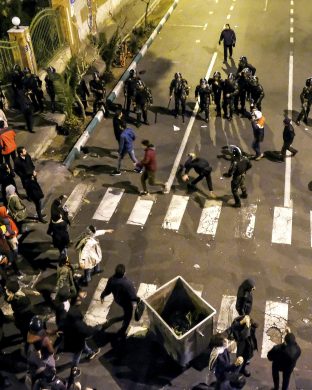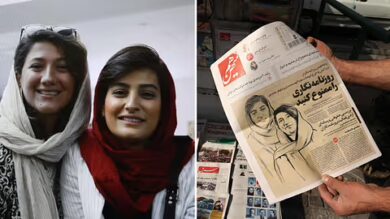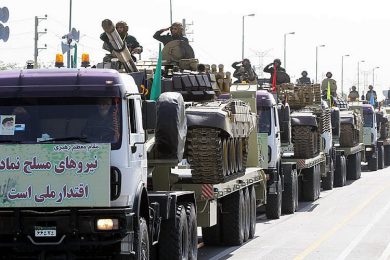The Islamic Revolutionary Guard Corps (IRGC) is one of the world’s most powerful violators of human rights and international law. From executing peaceful protesters to orchestrating assassinations abroad, from training child soldiers in proxy militias to funding terrorism across borders, the IRGC commits crimes with impunity—shielded by the authority of the Iranian regime and the silence of much of the international community.
But impunity is not immunity. Around the world, there are legal tools and frameworks that can be used to hold the IRGC and its commanders accountable. Some have already been applied in landmark cases; others are underused or underdeveloped. What they all share is the ability to deliver something the regime fears: exposure, prosecution, and irreversible global stigma.
This article explores the legal pathways—existing, emerging, and proposed—to hold the IRGC accountable for its crimes. From sanctions and universal jurisdiction to international courts and civil litigation, the tools for justice exist. What’s needed is the political will to use them.
1. What Crimes Has the IRGC Committed?
Over the past four decades, the IRGC has committed a long list of internationally recognized crimes:
Crimes Against Humanity:
• Extrajudicial executions
• Torture and enforced disappearances
• Mass killings (e.g., November 2019 protests)
• Persecution of minorities and women
War Crimes:
• Attacks on civilians in Syria and Iraq via proxy forces
• Use of starvation, chemical weapons (by allies), and siege warfare
• Targeting civilian infrastructure
Terrorism:
• Bombings, assassinations, and support for listed terrorist groups
• Cross-border kidnappings and executions (e.g., Ruhollah Zam)
Each of these violations falls under international law—and in many cases, under the domestic laws of countries around the world.
2. Universal Jurisdiction: Justice Beyond Borders
Universal jurisdiction allows national courts to prosecute certain crimes—like torture, war crimes, and crimes against humanity—regardless of where they were committed or the nationality of the perpetrator or victim.
Successful Cases:
• Germany prosecuted Syrian officials for war crimes under universal jurisdiction.
• Sweden convicted former Iranian prison official Hamid Nouri in 2022 for his role in the 1988 prison massacres.
Applicability to the IRGC:
• IRGC officers involved in torture or murder can be arrested and tried if they travel to countries with universal jurisdiction laws.
• Survivors and victims’ families in exile can initiate investigations in these countries.
Countries with strong universal jurisdiction laws include:
• Germany
• Sweden
• Norway
• France
• Netherlands
• Argentina
• South Africa
Action Needed: More countries must apply this principle to IRGC operatives and invite victims to submit cases.
3. Targeted Sanctions: Naming and Shaming IRGC Officials
Targeted or “Magnitsky-style” sanctions allow countries to freeze assets and impose travel bans on individuals responsible for serious human rights abuses or corruption.
Current Status:
• The U.S. has sanctioned hundreds of IRGC officials under Global Magnitsky and counterterrorism laws.
• The EU and UK have sanctioned a smaller number, mostly related to protest crackdowns.
• Canada has used its Special Economic Measures Act but has not designated the IRGC as a terrorist entity.
Why It Matters:
• Freezes property, bank accounts, and assets abroad
• Blocks access to luxury travel and education for families
• Signals moral condemnation and isolates perpetrators
Action Needed: Expand sanctions lists to include mid-level IRGC commanders, prison wardens, cyber units, and financial facilitators.
4. Terrorist Designation: Legal and Financial Consequences
Designating the IRGC as a terrorist organization has profound legal implications.
Impact:
• Criminalizes material support and cooperation
• Allows asset forfeiture and legal action against banks or businesses linked to the IRGC
• Enables criminal prosecution of recruiters, facilitators, and money launderers
Current Designation:
• United States: Designated the IRGC as a Foreign Terrorist Organization in 2019
• Canada: Has only designated the Quds Force, not the full IRGC
• UK and EU: Have sanctioned individuals but not fully designated the IRGC
Action Needed: Allied democracies must follow the U.S. lead in designating the entire IRGC.
5. Civil Litigation: Victim-Led Justice
In the U.S., victims of terrorism and human rights abuses can sue foreign governments and entities in civil court under:
• Alien Tort Statute
• Foreign Sovereign Immunities Act (Terrorism Exception)
• Justice Against Sponsors of Terrorism Act (JASTA)
Notable Cases:
• Victims of the 1983 Beirut bombing (linked to IRGC-Hezbollah) won judgments worth billions.
• Families of 9/11 victims sued Iran for material support to al-Qaeda.
IRGC Accountability:
• Lawsuits can be filed for torture, wrongful death, and terrorism against the IRGC and Iranian state.
• Judgments can be enforced by seizing frozen assets.
Action Needed: Expand access to civil remedies in more countries and publicize legal options for victims in the diaspora.
6. International Criminal Court (ICC): Limits and Possibilities
Iran is not a party to the Rome Statute, which established the ICC. However:
• If IRGC crimes are committed in member states (e.g., Iraq, Afghanistan), they could fall under ICC jurisdiction.
• The UN Security Council could refer the situation in Iran to the ICC, as it did with Sudan and Libya.
ICC Crimes:
• Torture
• Mass executions
• Targeting of civilians in war zones
• Crimes against humanity committed by proxies
Challenges:
• Political resistance from Security Council members (e.g., Russia, China)
• Iran’s non-membership
Action Needed: Civil society and governments should prepare ICC filings and advocate for referrals by democratic allies.
7. Truth Commissions and Documentation Initiatives
Before prosecutions can succeed, evidence must be collected.
Ongoing Efforts:
• UN Fact-Finding Mission on Iran (established in 2022)
• Iran Human Rights Documentation Center (IHRDC)
• Aban Tribunal: People’s tribunal documenting November 2019 massacres
• Justice for Iran: Legal support for survivors of state violence
Goals:
• Identify perpetrators and chains of command
• Preserve forensic and testimonial evidence
• Create public pressure and historical record
Action Needed: Fund and support documentation efforts—especially survivor testimonies and verified digital evidence.
8. Arrest Warrants and Interpol Notices
Under international law, countries can issue arrest warrants for IRGC commanders accused of crimes. These can be escalated to Interpol Red Notices, enabling global tracking.
Benefits:
• Prevent perpetrators from traveling freely
• Force public reckoning when visas or diplomatic access is denied
• Support civil or criminal proceedings abroad
Precedent:
• Argentina issued Interpol notices for Hezbollah and Iranian officials in the 1994 AMIA bombing case.
Action Needed: Democratic governments must stop hosting, legitimizing, or negotiating with IRGC commanders—and begin pursuing their arrest.
9. Legal Protection for Victims and Witnesses
For justice to move forward, victims and whistleblowers must be protected.
Risks They Face:
• Retaliation against family members in Iran
• Digital surveillance and hacking
• Threats or attacks abroad (e.g., Masih Alinejad case)
Support Needed:
• Legal aid and asylum pathways for at-risk witnesses
• Secure channels for evidence submission
• Funding for survivor-led advocacy
10. A Global Accountability Strategy
To succeed, legal efforts must be coordinated and persistent.
Steps Forward:
• Coalition Building: Human rights organizations, diaspora communities, and legal networks must collaborate across borders.
• Political Advocacy: Lobby governments to use existing laws and adopt new ones.
• Strategic Litigation: Focus on high-impact cases that expose systemic IRGC crimes.
• Public Pressure: Name and shame IRGC perpetrators through media, art, and storytelling.
Conclusion: Justice Is Possible
Justice for IRGC crimes will not come all at once. But it will come.
It will come through courtroom doors opening in Berlin, Stockholm, and The Hague.
It will come through the voices of mothers, survivors, and exiles demanding their day in court.
It will come when IRGC officials can no longer travel, spend, or speak without fear of being named and arrested.
Join Our Newsletter!
Stay informed with the latest updates, news, and ways to take action in the fight for justice and global security. Sign up now to get updates delivered straight to your inbox!





